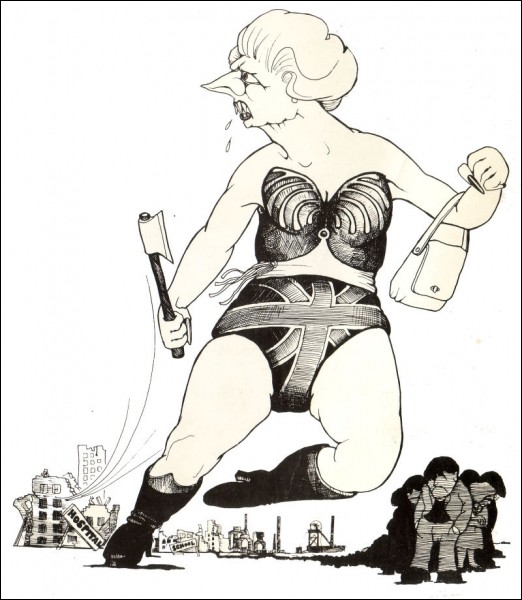Search
Democracy Links
Member's Off-site Blogs
the hair, the air & the glare .....

Who is society? There is no such thing. There are individual men and women, and there are families.
Margaret Thatcher, 1987.
Those words were the black hole at the core of Thatcherism. They revealed the callous autocrat beneath the imperious helmet of hair, the re-tooled teeth and the assiduously poshed-up vowels: Margaret Thatcher believed in a Darwinian struggle for the survival of the fittest. If the losers led lives that were nasty, brutish and short, it was their fault; all you could do was police them. An orgy of corporate greed and private plunder at the expense of ordinary people is her chief political legacy.
There is much about Thatcher we can all agree on. Yes, she rose from the Grantham grocery store to 10 Downing Street with unswerving resolve. Yes, she rescued Britain from the infamous 1979 winter of discontent and set her nation on a new course. Yes, she punched above her weight in world affairs.
But she did these things at terrible cost. Her household bible was The Road to Serfdom by that now-discredited high priest of so-called economic rationalism, Friedrich Hayek, who preached that government austerity solved everything so long as the rich were allowed to get richer. In her manic pursuit of this free market utopia, Thatcher gutted industries and entire communities in Wales, Scotland, and England's north, destroyed lives and jobs, and cemented in place the hapless British underclass which her pygmy Tory successors are oppressing yet again.
Freed from prudent restraint by her "Big Bang" deregulation of 1986, British banking turned itself into what was essentially a giant Ponzi scheme notorious for its systemic corruption, paving the way for the crash of 2007. Britain's Big Five banks were forced to pay some £11 billion ($16 billion) in fines and penalties last year alone, about 40 per cent of their profits, but the children of Thatcherism, the Etonian spivs and Essex Wide Boy traders of the City of London, continue to whoop it up over Krug and cocaine suppers at bonus time.
Another great myth of St Margaret, touted by Rupert Murdoch this week, is that she was "a champion of the profound idea of freedom," a prime mover in the collapse of Soviet communism. Tosh, Lord Copper. The truth is more complex. Ronald Reagan called on Mikhail Gorbachev to tear down the Berlin Wall but Thatcher was secretly keen for it to stay up. Papers from the old Soviet foreign ministry revealed that she fought tooth and nail against German reunification, fearing that it would consign Britain to second-class status as a European power.
For the Iron Lady, freedom was malleable. She sold arms to Saddam Hussein and sent the British SAS to train Khmer Rouge guerillas in Thailand. She supported the apartheid regime in South Africa, proclaiming to Commonwealth leaders in 1987 that "the African National Congress is a typical terrorist organisation … anyone who thinks it is going to run the government in South Africa is living in cloud cuckoo land."
In 1999, by then well out of office, she developed a mad crush on Augusto Pinochet, the homicidal Chilean tyrant who had sought asylum in Britain. "It is you who brought democracy to Chile," she very publicly assured him. Her oafish son Mark traipsed around the world invoking her name to enrich himself on dodgy arms and construction deals.
Hubris got Margaret Thatcher in the end. Like so many self-made grandees, she came to believe she could do no wrong. Her vicious poll tax of 1988, which would have seen a dustman from Dagenham pay the same council rates as the Duke of Westminster, was too much even for her own acolytes to swallow. Finally they plucked up the courage to roll her.
The divisions and damage she created live on.
Mike Carlton
- By John Richardson at 13 Apr 2013 - 7:56pm
- John Richardson's blog
- Login or register to post comments
Recent comments
1 day 6 hours ago
1 day 8 hours ago
1 day 8 hours ago
1 day 8 hours ago
1 day 9 hours ago
1 day 9 hours ago
1 day 9 hours ago
1 day 17 hours ago
1 day 17 hours ago
1 day 19 hours ago